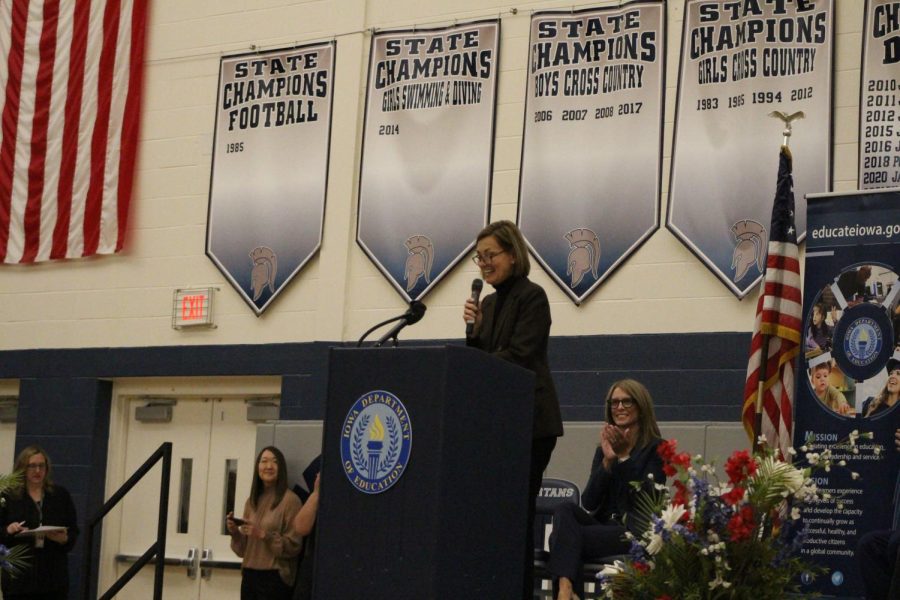
Caroline Sierk
Governor Reynolds spoke at Pleasant Valley High School in October of 2021, six months before she passed the Students First Act, which many educators feel is an attack on public education.
Major contributions made by Robyn Samuelson
Following the most recent midterm election, many are questioning whether Governor Kim Reynolds is fit to hold executive power over Iowa for a second term. Teachers, specifically, have raised concerns regarding Reynolds’ educational policy.
“The separation of church and state is guaranteed by the Constitution of The United States. The Students First Act directly undermines that separation,” English teacher Robyn Samuelson raised an important point regarding the action carried out in Reynolds’ last term.
Reynolds’ Students First Act, partially passed earlier this year, saw the allocation of state funds to privatized education. “Parents who choose to move their eligible children from public to private schools or other educational programs will receive a portion of the ‘per pupil’ funds allocated annually by the state to use for qualified educational expenses,” Reynolds writes on her website.
Many outwardly oppose this decision, citing it as a theft of taxpayer dollars and incentivization of private education over public education. “This act has the potential to erode public education funding even further so that already struggling schools and students will fall further behind… Already struggling schools will lose funding for every student that opts out, making the task of educating the average Iowan child more and more difficult,” Samuelson stated.
As a consequence of this alleged aid to private education, more private institutions are being constructed across the state to meet the demand of concerned parents. Locally, St. John Vianny and Our Lady of Lourdes Church have requested rezoning on Criswell Street in Bettendorf to construct a K-8 private educational institution.
This decision has received backlash from concerned educators and residents of Criswell Street, who allege that the growth of Criswell Street will transform a once-quiet street into a traffic nightmare.
Samuelson noted that the Quad Cities is not the only area in Iowa that suffers from Reynolds’ Students First Act. “Public schools are underperforming in Sioux City, according to actual and/or anecdotal evidence. The narrative of my sister-in-law is that Sioux City public schools are academically inadequate for her children. She has chosen to send them to Catholic school, which comes with indoctrination and a steep price tag,” Samuelson contiuned.
A point Samuelson cites as a primary concern of hers is the deepening economic divide between the educated and the uneducated. “Look closely at the language of The Students First Act and it may appear that parents are simply being given an opportunity to use some tax dollars to send their kids to a better school – how is that a bad thing?” she continued. “Think about Sioux City again, if money flows out of public schools because educationally-minded families send their students to private schools, very quickly schools for the haves and have-nots will be private and public, making private school more and more appealing.”
Private education has always trumped public schools in test scores. Add on a curriculum untouched by the state, and it’s clear to see why many parents, concerned about the content of state curriculums, feel that their child is better served at a private school. However, when the state seems to be encouraging the fleeing from public schools, motivations are left unclear. “It will not take long before an education system that further solidifies class inequality is subsidized by the State. This makes me wonder, what is the governor’s goal?” Samuelson finished.
As private schools continue to see heightened enrollment numbers, the Quad Cities, along with the rest of Iowa, is left to watch the painful death of public education.
